After much delay, and maybe as much waiting, I can now -- after the whirlwind celebration, parade, draft and free agency, sit down and dish out my much-anticipated 2008/2009 player grades for your Stanley Cup Champions.
Like last year, these grades are given based on the player's contribution when compared to what was reasonably expected during the course of the year from the player, and includes consideration of playoff performance.
There will be grades for every main roster player on the Cup-winning squad, including grades for the Penguins' few recently departed free agents, but not for those who may have been traded along the way.
So, without prolonging this any further ..
EVGENI MALKIN: Malkin, 22, was probably the Penguins' best player this season. He captured his first Art Ross Trophy as the league's leading scorer in the regular season, then followed that up with the Conn Smythe Trophy as playoff most valuable player int he post-season, demonstrably erasing what was starting to be an unfortunate trend of disappearing or running out of gas in the playoffs when things meant the most. Malkin is a dangerous goal scorer who is almost as good at setting up his teammates as he is scoring goals, and he also is becoming a pretty good defensive player in this league. He led the league in takeaways this past season -- getting more than the reigning Selke Trophy winner Pavel Datsyuk. If you said that Malkin was the best overall player in the game right now, I think a lot of hockey pundits would agree. A+
SIDNEY CROSBY: The Penguins' Captain and #1 center is already on everyone's short list of the world's best players, but that didn't stop him from continued development this year. Crosby, still only 21, has really matured for Pittsburgh on the ice, and remains the NHL's ambassador off it. While being the focus of most opponents' game plans, Crosby scored 33 goals and added 70 assists to finish 3rd in the scoring race behind teammate Malkin and Washington Capitals' LW Alexander Ovechkin -- and he did that in 5 less games than a full slate. Meanwhile, Crosby became one of the Penguins' go-to faceoff men and, despite being continually criticized for not being a true goal-scorer, went goal-for-goal with Ovechkin in the Penguins' 2nd round 7-game playoff win over the Washington Capitals when Pittsburgh needed it the most. He was the youngest Captain to ever lead his team to the Stanley Cup this year. There's not much more the Penguins' can ask of Crosby and he continually delivers for them. A+
MARC-ANDRE FLEURY: Fleury's goals against average and save percentage were not off the charts this year, but there's no denying that this kid wins games. He's won 35 or more contests for three seasons in a row now on his way to 2 consecutive Cup Final appearances and 1 championship. Like Grant Fuhr, the Edmonton Oilers' 4-time Stanley Cup Champion and Hall-of-Famer, Fleury makes the saves when they matter the most. At least 3 or 4 signature stops defined his post-season this past year -- including a huge one with one second left and the Stanley Cup in the balance late in game 7. Without him, the Penguins don't win the championship this year. A-
BILL GUERIN: Guerin, acquired by the Penguins in early March on the trade deadline for what ended up being a 3rd round draft pick, was huge for Pittsburgh after being acquired. He seamlessly meshed with Crosby as a RW on the Pens' #1 line and, even at 38, provided them scoring and a huge dose of leadership both down the stretch when the Penguins were fighting to obtain and keep a playoff berth. Then he did the same thing all the way through the playoffs. While it's fair to wonder how much Guerin has left in the tank at this point, he was a key, key contributor to the Penguins' Stanley Cup Championship. B+
JORDAN STAAL: Staal, still only 20 years old, rebounded relatively well from what most people thought was a step-back in his sophmore year in the 2007/2008 season. At just about the 50 point level in 2008/2009, Staal anchored one of the best 3rd lines in hockey this year, and did a pretty darn good job doing it. It can't be easy for #11 because he has 2nd line talent and probably will never break though to play with other top scorers on the first two lines for the Penguins as long as Crosby and Malkin are around, but Staal serves an extremely key role for Pittsburgh, and for the 2nd year in a row, that showed itself more than any other time in the post-season. Staal elevates his game when the stakes are the greatest and he again was one of the Penguins best players in their 2nd consecutive Stanley Cup Final. Because of him, the Penguins have the best triumverate of centers in the National Hockey League and are a nightmare to match up against down the middle. B+
SERGEI GONCHAR: It would be easy to give Gonchar an incomplete, since he missed most of the season after suffering a shoulder injury in the Penguins' first pre-season game last September, but the truth is that his absence was maybe the biggest reason the Penguins struggled for a fair part of last year before he returned in mid-February. When he did come back, he scored 19 points in 25 games and the Penguins only lost 3 more times during the remainder of the regular season. While he is 35, Gonchar remains a top defenseman in the NHL and is one of the top 10 two-way rearguards in the entire league. And playing through a torn MCL for the last 2 rounds of the post-season after Ovechkin's cheap knee-on-knee hit also showed how tough and committed he truly is. B+
ROB SCUDERI: You can't say enough about how good of a defensive defenseman Scuderi was for the Penguins' this past year. He had his best season and finally showed a lot of people league-wide how valuable and intelligent of a player he truly is. Matched up against the opponents' best forwards in every single round of the palyoffs, his shut down work for those 2 months was some of the best I've seen in quite a while. Scuderi is one of the best 5-on-3 penalty killers in the game because of his positioning and stick-defense. And, of course, who can forget the several game-preserving saves he made in the crease late in game 6 of the Stanley Cup Finals. As a testament to what he deserved, Pens' GM Ray Shero said he didn't ever remember being happier for a player and his family when "The Piece" accepted a nearly 4-million dollar per season free agent contract with the LA Kings that the Penguins simply weren't able to match because of salary cap constraints. The Penguins will miss his presence on their blueline for sure. B+
MATT COOKE: Cooke probably flied under the radar of most Penguin fans this past year, but not this observer. He was one of the Penguins' most consistent performers all season long. Before the year started, many looked at him as the replacement agitator for former Pen Jarkko Ruutu. I knew Cooke would do that and be so much more, and that's exactly what he was. Cooke was one of the top hitters in the league all season long, put up 33 points in a 3rd line role, and even filled in capably when needed throughout the season on the top 2 lines. There's not much more the Penguins could have asked from him. B+
MAX TALBOT: Talbot's importance to the Penguins simply cannot be understated. He is the team's glue in the locker room, and a valuable contributor on the ice. This past season, he played in a variety of roles and, for the 2nd year in a row, raised his game about 3 notches in the playoffs. The "Superstar" was the Penguins' 3rd leading goal scorer in the playoffs, posting 8 tallies after only 12 regular season goals, including both of Pittsburgh's markers in game 7 of the Cup Final when everything was on the line. When you ask for the short list of names who you know you're going to be able to count on in clutch situations, he's on it. B+
BROOKS ORPIK: Orpik isn't spectacular, and he didn't have another shift for the ages this year like he did in last season's Stanley Cup Finals where he decked 4 Red Wings in a 15-second span on one shift in game 3, but that doesn't mean that Orpik isn't one of the most valuable Penguins. He paces the team physically from the backend and was 2nd in the league in hits this past year. He's eats up big minutes, is smart defensively and skates well enough to keep up with the opposition's top forwards. While he may not be worth quite as much as his 3.75 million dollar per year contract, he's pretty close to it because there's nobody else on the Pittsburgh blueline who does what he does. B+
CHRIS KUNITZ: Acquired about a week before the trade deadline this season in the deal that saw blueliner Ryan Whitney get sent to Anaheim, Kunitz immediately stepped into the flank on Crosby's line and fit in well. He contributed offensively and added a space-clearing physical net presence to the ice next to #87. His ability to score dried up in the playoffs, which is somewhat surprising since the post-season game is more tailored to the way he plays, but Kunitz has generally shown himself to be a consistent 25 goal scorer in this league, so that's what you should expect from him. The sandpaper and character he brings to the lineup is a bonus. B
RUSLAN FEDOTENKO: Fedotenko was signed to a one-year contract last summer as a free-agent largely because the Penguins knew him to be a fair offensive contributor, but more importantly, a known playoff performer. True to form, that's what the Penguins got from Rusty this year. While he had an average regular season with 16 goals, he was one of the Penguins' better players in the playoffs with 7 goals and 14 points. He continues to be a decent 2nd line option for the Penguins who is all about winning -- as evidenced by the fact that, after his strong year, he took a pay cut just to return to Pittsburgh and do the one-year contract all over again in the upcoming final season in Mellon Arena. B
TYLER KENNEDY: TK still is somewhat of an inconsistent player, but he showed a little more potential to be a scorer this year, chipping in 15 goals and 35 points playing almost exclusively in a 3rd line role. His speed continues to be something that other teams have a hard time accounting for, and he doesn't shy away from the physical play either. Kennedy is a valuable member of the Penguins' 3rd line and, after a solid post-season, only has room to improve in years to come. B
HAL GILL: The Penguins' got a relatively strong season out of Gill this past year -- his last with Pittsburgh after signing a free-agent contract with Montreal Canadiens earlier this month. With Gill, what you see is what you get, and that is a solid defensive defenseman who isn't that mobile but excels by being good positionally most of the time. He also was a great penalty killer for Pittsburgh and there was a reason he was paired with Scuderi and matched against the other team's top forwards all post-season long. B
MARK EATON: For the first time after the prior 2 injury-plagued seasons, Eaton stayed relaitvely healthy for Pittsburgh this last year and was pretty solid most of the season because of it. Eaton is a good positional player and strong shot blocker who helps counter-balance the Penguins other offensive defenseman, and playing a full season under Dan Blysma's attacking system should only help his game because Eaton also is a decent skater with good hockey sense. His 4 goals in the playoffs were a testament to that. B
KRIS LETANG: When Letang first came into the league, he was known as an offensive player, but surprised this author with his physicality and defensive play. I believe former Pens' coach Michel Therrein was the primary reason for that, but it helped round out Letang's game. While Kris still has an awful lot of offensive talent, including great vision, a good shot, and high-end stick skills, he needs to be more consistent. Tanger put up 33 regular season points, but was one of the Penguins' better post-season players with 4 goals and 9 helpers during the Penguins' Cup run. With Ryan Whitney now gone, Pittsburgh will start relying on him an awful lot more this coming year. This coming season will be Letang's third in the league, and he is poised to break out. B
CRAIG ADAMS: Adams, another Stanley-Cup winning veteran pickup for the Penguins near the trading deadline, was a valuable role player down the stretch and through the post-season for Pittsburgh. He brought grit, intelligence and solid defensive play to the Penguins 4th line, and even chipped in with 3 goals in the post-season. While 2 were empty netters, the other goal he scored -- the 2nd goal of game 7 against the Washington Capitals in round 2 -- was a huge one, because it came 8 seconds after Crosby opened the scoring and really helped deflate the Caps. Adams played well enough, and did a good enough job on draws, during his short tenure here that the Penguins re-signed him for another season and, in the process, said goodbye to another valuable role player, Mike Zigomanis. B
MIKE ZIGOMANIS: Zigomanis was acquired for future considerations early in the season from the Phoenix Coyotes, largely because he was one of the better faceoff men in the game. When he arrived in Pittsburgh, he didn't disappoint in that area. He clicked at near 65% in the circle and was so obviously effective doing so that former coach Michel Therrein regularly had him out on the power play just so he could take -- and win -- key faceoffs. Zigomanis' season ended about halfway through the year when he suffered a shoulder injury in a game against the New York Rangers in Madison Square Garden. While he rehabilitated himself well enough to return to game action by the Stanley Cup Finals, the Penguins' didn't use him. Unfortunately, his injury sealed his fate in Pittsburgh, but he was more than effective when in the lineup. B
PETR SYKORA: If there was one guy who had been pretty reliable for the Penguins since being signed a few years ago, it was Sykora. He was a fixture on the power play and could be counted on for 25 goals a year playing on Malkin's RW. That all changed late this season, however -- coincidentally or otherwise right around the time Therrein was fired and Bylsma came on board. Sykora was so bad in the last 40% of the season that the veteran scorer ended up being a healthy scratch for much of the playoffs. That's what just a few goals during that stretch will do for you. Before that, however, Sykora had already popped near 20 -- including 10 game winners -- and was doing what he had consistently done before, which was contribute offensively. Rumors abounded that Sykora was suffering from a shoulder injury late in the year, but nothing official was ever revealed about it -- even after the post-season. Unfortunately, his slump was so long, and the skating system Blysma installed is so untailored to Sykora's game, that the Penguins let him walk as a free agent last month. It might have just been his time to go -- even if it came somewhat unexpectedly. B-
ALEX GOLIGOSKI: GoGo, as he's affectionately known within the organization, spent about 1/2 a season with Pittsburgh this year before the Penguins' depth on the blueline forced him back to Wilkes-Barre, where he didn't have to clear waivers. When he was with the big club, however, his offensive skills didn't disappoint, as the 20 points he put up during that time attest to. He continues to need work in his own zone, though. Goligoski is not a big player, so he has to rely on smarts and positioning to defend well. More consistency would help, too, but that progression is a natural one for a young player like him. With the 3-year contract he signed, he just about ensured himself a place on Pittsburgh's blueline full time for this coming season. B-
PASCAL DUPUIS: Dupuis was miscast late last season as a fill-in on one of the top lines after being acquired at the trade deadline from Atlanta with traitor Marion Hossa. He's strictly a 3rd or 4th line player who will regularly put up just about 10 goals and 25 points, which is nearly how he produced this past season. He skates well, has a good shot and is capable defensively, but has a limited ceiling after that. Because the Penguins should be able to get what they get from him for a bit less than the 1.4 million dollar 3 year contract he signed before this last year, however, rumors persist that Pens' GM Ray Shero is trying to move him. C
PHILIPPE BOUCHER: Boucher was acquired early in the year from the Dallas Stars for Darryl Sydor and, at the time, it was an interesting acquisition. Boucher was 2 seasons removed from being an All-Star while in Dallas, and it was worth it to see if he might recapture that form in exchange for a guy who hadn't been getting a lot of playing time here. Former coach Therrein was high on Boucher, but he got hurt not long after arriving and missed about 4-5 weeks of time. By then, Bylsma was nearly on board and when HCDB did arrive, he didn't quite have the same feel for #43. Regardless, Boucher was unable to regularly crack the lineup most of the rest of the season and, while he became a good mentor for Kris Letang, that alone was far from enough for Shero to keep the unrestricted free agent -- especially at his 2.5 million dollar salary from last year. C
ERIC GODARD: There's no secret to what Godard did this past season. He was a fourth liner who brought a physical presence to the team. While he does his job well when called upon, keeps other teams honest, and doesn't take a lot of stupid penalites, he didn't dress for a single playoff game. With the addition of physical -- and big -- free agent forward Mike Rupp at nearly the same salary, there's speculation that the Penguins are looking to move Godard. C
MIROSLAV SATAN: Satan was the Penguins' most notable free agent signing last summer, after Hossa spurned them on a course to being a back-to-back Stanley Cup Final loser. While he wasn't supposed to solely replace Hossa, the expectations on Satan were probably too high. He did score 17 goals, but with only 36 points in 65 games and a failure to click with Sidney Crosby on the top line, it's not unreasonable to understand how Satan wasn't worth the 3.5 million the Penguins paid him this year. What was a bit surprising was that the Penguins were forced to waive him and send the veteran scorer to Wilkes-Barre. It's true that Satan didn't play up to expectations, but his stint in the minors wasn't really due to this play -- it was mainly to keep his salary from being counted against the cap when the Penguins acquired Bill Guerin. To his credit, however, Satan didn't mope when he was sent to the AHL for the first time in 11 seasons. He worked hard and set a good example. And when the playoffs came around, he returned to the big club as a replacement for the struggling Sykora. While Satan didn't make a huge impact in the post-season, he upped the grit and intensity in his game and did make a little bit of an offensive splash at a few notable times -- the most important of which was his opening breakaway goal against Cam Ward and the Carolina Hurricanes in game 1 of the Eastern Conference Finals. The Penguins, not surprisingly, let Satan walk into free agency last month. C-
That's it boys and girls. Your 2008/2009 Stanley Cup Champion grades. It's nice to see mostly A's and B's, isn't it? Well, that's what happpens when you reach the top of the mountain. You usually don't have too many passengers.
More on the Penguins' prospect camp -- which begins Monday -- next week.
Subscribe to:
Post Comments (Atom)






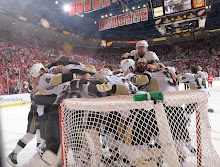
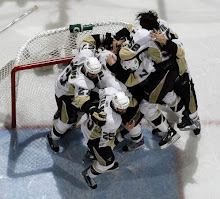

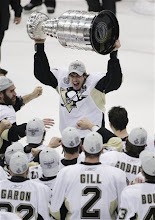
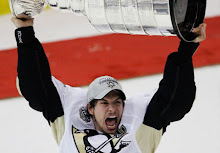
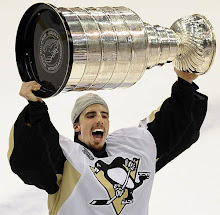

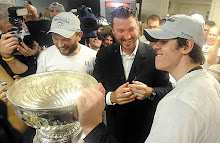
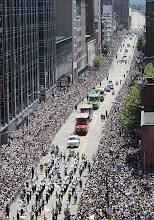



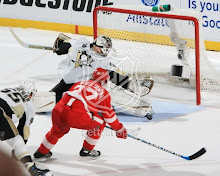
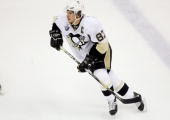
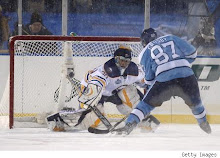
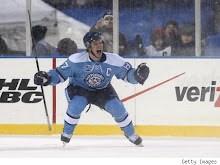


No comments:
Post a Comment